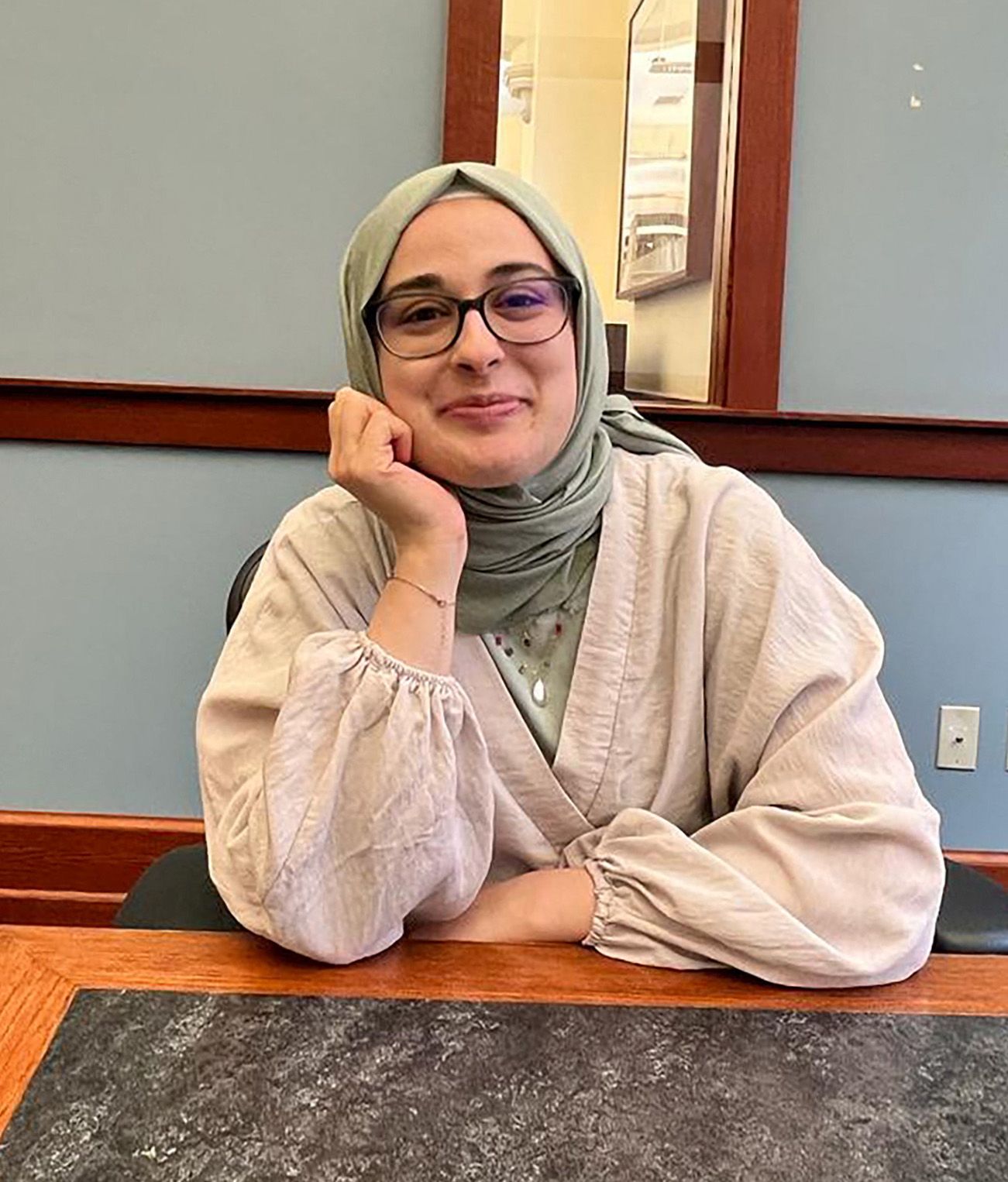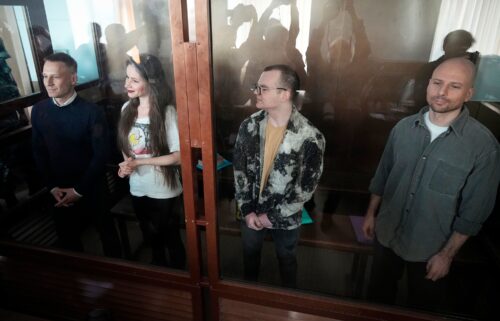Tufts University student and government argue in court whether she can challenge ICE arrest

Protesters hold signs reading "Free Rumeysa Ozturk" and "come for one face us all! solidarity forever" during a demonstration in Somerville
By Dalia Faheid and Andy Rose, CNN
(CNN) — Attorneys for Rümeysa Öztürk told a federal judge in Vermont Monday that she was unconstitutionally arrested, leading to her detention in a Louisiana immigration facility that the Tufts University PhD student described as “unsanitary, unsafe, and inhumane.”
A nearly three-hour hearing for Öztürk – whom the US government has accused of being “engaged in activities in support of Hamas” – came after the Washington Post reported a State Department office failed to find evidence tying her to antisemitism or terrorism just days before she was arrested by Immigration and Customs Enforcement.
“There is not discretion, even in immigration law, for the government to violate the Constitution,” said Öztürk’s attorney, Jessie Rossman, in Monday’s hearing. Rossman argued that the only reason for Öztürk’s detention was that she co-authored an essay in the Tufts student newspaper criticizing the university’s response to pro-Palestinian students.
The Trump administration says Öztürk’s habeas corpus petition – requesting her release over a constitutional rights violation – should be dismissed because it should have been filed in the state where she was being detained.
After her arrest, Öztürk was shuttled from Massachusetts to New Hampshire, and then to Vermont – with the government citing a lack of bed space in immigration facilities – before finally reaching a detention center in Louisiana more than 1,500 miles away, court documents show.
Acting US Attorney Michael Drescher acknowledged Monday that the government had initially refused to reveal to Öztürk’s attorneys in Massachusetts where she was when the case was first filed, but said that doesn’t matter under the law.
“The fact that counsel didn’t know (where she was) does not affect that analysis,” said Drescher.
US District Court Judge William K. Sessions responded skeptically to the government’s argument that there was no way for Öztürk to move forward with the case.
“What if she is right? What if there was a constitutional violation in her arrest? The only remedy she is seeking is release, and you are suggesting that the court has no power to release her,” Sessions said.
If Sessions issued an order for Öztürk’s release and the government says it doesn’t have to honor the directive, “then we’re in a constitutional crisis,” the judge said.
“I don’t want to in any way suggest that we would violate an order of the court,” Drescher told Sessions.
Report says there was lack of evidence of terror connections
Besides pointing to the lack of evidence against Öztürk, the memo detailed in the Washington Post report noted her name was not associated with any terrorism-related information during a search of US government databases, according to the Post, citing government officials briefed on the memo.
The 30-year-old former Fulbright scholar, who is originally from Turkey and has been in the US on an F-1 student visa, was detained nearly three weeks ago by masked officers near her apartment in Somerville, Massachusetts.
The government has not specified what the alleged activities “in support of Hamas” were. Her lawyers say she is unfairly being punished for speaking out in favor of Palestinian rights.
Öztürk is one of several international university students facing deportation as the Trump administration takes aim at pro-Palestinian protesters and activists on college campuses. The arrests of scholars and students at the hands of masked law enforcement officers – who have taken them into custody by ambushing them on city streets and near their homes – have sent a chill across the international student community.
Last week, a group of 27 American Jewish organizations filed a brief in Öztürk’s case, arguing that deporting students like Öztürk on the premise of fighting antisemitism is not protecting the community.
“To watch state authorities undermine the same fundamental rights that empowered so many Jewish Americans is chilling; to know it is being done in the name of the Jewish people is profoundly disturbing,” the brief said.
The Department of Homeland Security originally asked the State Department to cancel Öztürk’s visa under a legal authority meant to safeguard US foreign policy interests, according to the Washington Post, but the State Department memo said Secretary of State Marco Rubio lacked the grounds to do that. The State Department said the visa could still be revoked without using that particular legal authority because the Immigration and Nationality Act gives the secretary of state complete discretion to do so.
CNN reached out to DHS and the State Department for comment on the Washington Post report.
In Monday’s hearing, her attorneys asked Sessions to rule that the Vermont district court is the appropriate venue to hear the case since it is the last place she was taken before a final transfer to Louisiana. Öztürk’s attorneys said they do not dispute that the government has the right to revoke her visa, but believe the manner in which she was taken into custody violated her rights, and she should be freed while continuing to fight deportation in immigration court.
Sessions said it would be unusual to release a person who is in custody without a bail hearing, but Rossman said there was no reason to think her client would flee.
“She is not a flight risk,” said Rossman. “Quite to the contrary, she is desperate to return to Tufts” to complete work on her doctorate degree.
Sessions said he would take the issue “under advisement” and did not indicate when he might rule.
‘Afraid for my safety’
A week before her arrest, Öztürk had spoken to a lawyer because she was worried for her safety. She was afraid she would be targeted because a pro-Israel website accused her of being a terrorist sympathizer and published her photo along with personal information.
Six plainclothes officers surrounded Öztürk in late March, neighborhood surveillance video appears to show. The officers did not show their badges until she was restrained, the video shows. When the men approached her, she didn’t realize they were government officials.
“I thought they were people who had doxxed me and I was afraid for my safety,” she wrote in a signed statement filed with the court.
Once she was taken to an SUV, they told her she was being arrested but wouldn’t explain why.
At one point, the officers removed her from the car and shackled her feet and belly before putting her in a different car, she said.
Öztürk said she repeatedly asked to speak with her attorney, but was denied or told she would be able to later. She told the officers she would remain silent after they asked for her name.
“We are not monsters,” the officer told her after she asked if she was safe. “We do what the government tells us.”
They told Öztürk they would be taking her to Vermont because there were no detention centers in Massachusetts for women, she recounted.
“For nearly 24 hours, her attorney was unable to locate her as ICE agents moved Ms. Öztürk from Somerville to Methuen, MA; then, to Lebanon, NH; and finally, to St. Albans, VT, where she was held in a detention cell overnight before being put on an early morning flight from Patrick Leahy Burlington International Airport to Louisiana the next day,” said the American Civil Liberties Union, which is representing her in the case.
Öztürk, who had been on her way to break her 13-hour Ramadan fast with friends when she was arrested, asked officers for a meal. They told her they couldn’t provide one but gave her two packets of crackers and water. She said she didn’t drink or eat because she was worried they could have poisoned them.
“I was afraid that if something happened to me, no one would know where I was,” she said.
‘An isolated place’
Once in Vermont, where she would remain for the night, Öztürk asked to speak to an attorney, but was told that she could not, according to her signed statement submitted to the court.
She later refused to sign a document initiating removal proceedings after she was told it was late and would be hard to find an interpreter.
Having fasted all day, Öztürk felt like she was going to faint, so she asked for a meal. They gave her more snacks.
At night, her statement says she was approached in her cell and asked questions about applying for asylum and if she was a member of a terrorist organization.
“It was an isolated place with four men and it was terrifying,” she said.
While she was at an Atlanta airport the next morning, Öztürk had an asthma attack. She used an inhaler, but when the attack persisted, she asked for medication to treat it. Officers told her they were unable to buy it and that she would get it at her last destination.
Once Öztürk arrived in Louisiana, she was taken to a staging facility where “we were placed in a cage-like vehicle and could not communicate with the officers detaining us,” she said. She waited for hours without food or water.
Access to food and other necessities was “very limited” when she first arrived at the South Louisiana ICE Processing Center.
Öztürk had another asthma attack, and had to wait about 15 minutes to be taken to a medical center, where a nurse removed her headscarf without her permission.
“You need to take that thing off your head,” Öztürk recalled the nurse saying. She was given a few ibuprofen pills.
Öztürk later had two more asthma attacks at the facility.
“I fear that my asthma is not being adequately treated and it will not be adequately treated while I remain in ICE custody,” she said in her statement. “The air is full of fumes from cleaning supplies and is damp which triggers my asthma.”
‘I miss interacting with my Tufts community’
Öztürk has about nine months left to complete her doctorate in child study and human development at Tufts University, she said. While in detention, she has been unable to work on her dissertation proposal because of the lack of access to needed material.
“I miss interacting with my Tufts community from working with my advisor and professors, supporting my labmates as we worked on peer reviews, my interactions with undergraduate students, and special projects like our Mosiac Art Project and the Collective Grieving Space for children,” she said in the written declaration.
She had been studying in the US since 2018, having received a master’s degree from Columbia University on a Fulbright scholarship, according to her lawyers. Upon graduation, Öztürk said she had planned to do post-doctoral research on positive media for youth.
Öztürk worries she will miss out on professional opportunities while in detention. She had been planning to be a presenter at a Minnesota conference this spring. This summer, she had plans to mentor other university students and to teach a class on children’s media.
Once released, she plans to stay with a friend before returning to her apartment.
“I pray everyday for my release so I can go back to my home and community in Somerville,” she said.
The-CNN-Wire
™ & © 2025 Cable News Network, Inc., a Warner Bros. Discovery Company. All rights reserved.
CNN’s Gul Tuysuz, Gloria Pazmino and Matthew Rehbein contributed to this report.


